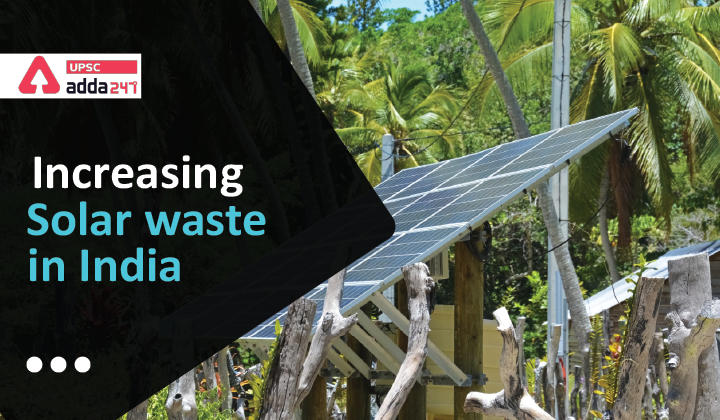Table of Contents
Solar Waste in India: Relevance
- GS 3: Infrastructure: Energy, Ports, Roads, Airports, Railways etc.
Solar Waste in India: Context
- According to a report prepared by the National Solar Energy Federation of India, India could generate over 34,600 tonnes of cumulative solar waste by 2030.
Solar waste in India
- Solar waste is the electronic waste generated by discarded solar panels.
- Solar waste is generally sold as scrap in our country.
- It is envisaged that solar waste can increase by at least four-five-fold by the next decade.
- The value of recoverable materials might surpass $15 billion by 2050, which would be enough to power 630 GW with two billion solar panels.
- Globally, it is expected that end-of-life (EoL) of solar panels will drive the solar panel recycling business in the next 10-20 years.

Issue of solar waste in India
- Solar panels have a life span of 20-25 years, so the problem of solar waste will not trouble in few years.
- It is, however, likely that India will face the issue of solar waste problems by the end of this decade, and solar waste might become the most prevalent form of waste in landfills after this decade.
- As of now, India does not have a sound solar waste management policy; though it has an ambitious solar power installation target.
- The issue of solar waste was not addressed in the last electronic waste management regulations in 2016.
- Cost of recycling: While recycling a solar panel cost between $20 and $30, sending it to a landfill costs merely $1-2.
International effort to deal with solar waste
- European Union (EU): The Waste Electrical and Electronic Equipment (WEEE) Directive of the EU imposes responsibility for the disposal of solar waste on the manufacturers or distributors who introduce or install such equipment for the first time.
- Though there are no federal policy in US to deal with solar waste, states like Washington and California have come up with extended producer responsibility (EPR) regulations.
- Australia announced a $2 million grant as part of the National Product Stewardship Investment Fund to develop and implement an industry-led product stewardship scheme for PV systems.
- Countries such as Japan and South Korea have already indicated their resolve to come up with dedicated legislation to address the PV waste problem.
Roadmap to resource-efficient solar energy
- Strong e-waste or renewable energy waste laws: EPR should be extended to the manufacturer and developers to take responsibility for end-of-life the solar panel.
- Infrastructure: To bring down the cost of recycling, infrastructure investment is required. Moreover, coordination between the energy and waste sector is needed to efficiently handle the renewable energy waste and build more recycling plants to avoid solar panels to end up in landfills.
- Environmental disposal and recycling of solar waste could be part of the power purchase agreement that SECI / DISCOMS / government signs with project developers.
- Ban on Landfills: Solar panel waste is harmful to the environment as it contains toxic metals and minerals that may seep in the ground. Hence, landfills should be completely banned.
- New business models, incentives or issues of green certificates to be provided to encourage the recycling industry to participate more in managing the solar waste.
- Research and Development: Technology advancements will be significant in reducing the impact of renewable energy waste. New panels, for example, use less silicon and produce less waste during the manufacturing process.
Also Read:




 TSPSC Group 1 Question Paper 2024, Downl...
TSPSC Group 1 Question Paper 2024, Downl...
 TSPSC Group 1 Answer key 2024 Out, Downl...
TSPSC Group 1 Answer key 2024 Out, Downl...
 UPSC Prelims 2024 Question Paper, Downlo...
UPSC Prelims 2024 Question Paper, Downlo...
